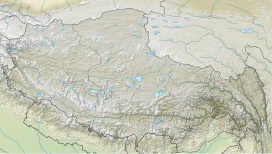This is an old revision of this page, as edited by Zanhe (talk | contribs) at 19:36, 18 September 2013 (add US Army source). The present address (URL) is a permanent link to this revision, which may differ significantly from the current revision.
Revision as of 19:36, 18 September 2013 by Zanhe (talk | contribs) (add US Army source)(diff) ← Previous revision | Latest revision (diff) | Newer revision → (diff)| Lanak La | |
|---|---|
 Lanak Pass is on the southeastern boundary of Aksai Chin Lanak Pass is on the southeastern boundary of Aksai Chin | |
| Elevation | 5,466 m (17,933 ft) |
| Location | Tibet, China |
 | |
The Lanak Pass or Lanak La is a mountain pass in Tibet Autonomous Region, China. It is on the southeastern boundary of the Aksai Chin region that is controlled by China but disputed by India.
The traditional border between China and India lies to the west at the Kongka Pass,Cite error: A <ref> tag is missing the closing </ref> (see the help page). However, India considers Lanak Pass as its boundary with China, citing several British-Indian travellers in the late 19th and early 20th centuries who wrote that the traditional boundary between India and Tibet were at Lanak La.
Indian sources state that there were no Chinese troops in the area in 1952 and that the Indian army patrolled up to the Lanak Pass until 1958. In 1959 Indian troops attempted to establish posts on the Lanak Pass, resulting in a clash with the Chinese soldiers who had already established posts at the Kongka Pass further west. The event preceded the Sino-Indian War in 1962.
References
- "Report of the Officials of the Governments of India and the Peoples' Republic of China on the Boundary Question - Part 2" (PDF). Ministry of External Affairs, India, 1961. Retrieved 30 August 2013.
- ^ Verma, Virendra Sahai (2006). "Sino-Indian Border Dispute At Aksai Chin - A Middle Path For Resolution" (PDF). Journal of development alternatives and area studies. 25 (3): 6–8. ISSN 1651-9728. Retrieved 30 August 2013.
- Vivek Ahuja. "Unforgiveable Mistakes, The Kongka-La Incident, 21st October 1959" (PDF). Retrieved 2011-11-02.
- Cite error: The named reference
maxwellwas invoked but never defined (see the help page).